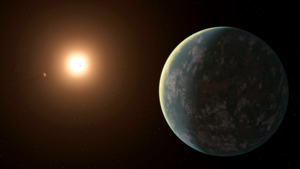Gliese 357
Tampilan
| Data pengamatan Epos J2000 Ekuinoks J2000 | |
|---|---|
| Rasi bintang | Hydra |
| Asensio rekta | 09j 36m 01.63722d[1] |
| Deklinasi | -21° 39′ 38.8776″[1] |
| Magnitudo tampak (V) | 10.906[2] |
| Ciri-ciri | |
| Tahap evolusi | deret utama |
| Kelas spektrum | M2.5V[3] |
| Astrometri | |
| Kecepatan radial (Rv) | −35,03±0,17[1] km/s |
| Gerak diri (μ) | RA: 138,722±0,023[1] mdb/thn Dek.: −990,342±0,020[1] mdb/thn |
| Paralaks (π) | 105,9789±0,0227[1] mdb |
| Jarak | 30,776 ± 0,007 tc (9,436 ± 0,002 pc) |
| Magnitudo mutlak (MV) | +11.13[4] |
| Detail | |
| Massa | 0.362[5] M☉ |
| Radius | 0.333[4] R☉ |
| Luminositas | 0.014[6] L☉ |
| Gravitasi permukaan (log g) | 4.96[5] |
| Suhu | 3,488[5] K |
| Metalisitas [Fe/H] | −0,14[5] |
| Rotasi | 74,3±1,7 h[7] |
| Kecepatan rotasi (v sin i) | 2.5[5] km/s |
| Penamaan lain | |
| Referensi basis data | |
| SIMBAD | data |
GJ 357 (Gliese 357) adalah sebuah Bintang deret utama tipe-M dengan aktifitas bintik bintang yang tak biasa rendah.[8] Bintang ini terletak 31 tahun cahaya dari Tata Surya,[9] di rasi bintang Hydra.[9]
Referensi
[sunting | sunting sumber]- ^ a b c d e Kesalahan pengutipan: Tag
<ref>tidak sah; tidak ditemukan teks untuk ref bernamaGaiaDR3 - ^ Koen, C.; Kilkenny, D.; Van Wyk, F.; Marang, F. (2010). "UBV(RI)C JHK observations of Hipparcos-selected nearby stars". Monthly Notices of the Royal Astronomical Society. 403 (4): 1949. Bibcode:2010MNRAS.403.1949K. doi:10.1111/j.1365-2966.2009.16182.x
 .
.
- ^ Gray, R. O.; Corbally, C. J.; Garrison, R. F.; McFadden, M. T.; Bubar, E. J.; McGahee, C. E.; O'Donoghue, A. A.; Knox, E. R. (2006). "Contributions to the Nearby Stars (NStars) Project: Spectroscopy of Stars Earlier than M0 within 40 pc-The Southern Sample". The Astronomical Journal. 132 (1): 161–170. arXiv:astro-ph/0603770
 . Bibcode:2006AJ....132..161G. doi:10.1086/504637.
. Bibcode:2006AJ....132..161G. doi:10.1086/504637.
- ^ a b Houdebine, E. R.; Mullan, D. J.; Paletou, F.; Gebran, M.; Bubar, E. J.; McGahee, C. E.; O'Donoghue, A. A.; Knox, E. R. (2016). "Rotation-Activity Correlations in K and M Dwarfs. I. Stellar Parameters and Compilations of v sin I and P/Sin I for a Large Sample of Late-K and M Dwarfs". The Astrophysical Journal. 822 (2): 97. arXiv:1604.07920
 . Bibcode:2016ApJ...822...97H. doi:10.3847/0004-637X/822/2/97
. Bibcode:2016ApJ...822...97H. doi:10.3847/0004-637X/822/2/97  .
.
- ^ a b c d e Passegger, V. M.; Reiners, Ansgar; Jeffers, S. V.; Wende-von Berg, S.; Schöfer, P.; Caballero, J. A.; Schweitzer, A.; Amado, P. J.; Béjar, V. J. S.; Cortés-Contreras, M.; Hatzes, A. P.; Kürster, M.; Montes, D.; Pedraz, S.; Quirrenbach, A.; Ribas, I.; Seifert, W. (2018). "The CARMENES search for exoplanets around M dwarfs. Photospheric parameters of target stars from high-resolution spectroscopy". Astronomy and Astrophysics. 615: A6. arXiv:1802.02946
 . Bibcode:2018A&A...615A...6P. doi:10.1051/0004-6361/201732312.
. Bibcode:2018A&A...615A...6P. doi:10.1051/0004-6361/201732312.
- ^ Morales, J. C.; Ribas, I.; Jordi, C.; McFadden, M. T.; Bubar, E. J.; McGahee, C. E.; O'Donoghue, A. A.; Knox, E. R. (2008). "The effect of activity on stellar temperatures and radii". Astronomy and Astrophysics. 478 (2): 507. arXiv:0711.3523
 . Bibcode:2008A&A...478..507M. doi:10.1051/0004-6361:20078324.
. Bibcode:2008A&A...478..507M. doi:10.1051/0004-6361:20078324.
- ^ Suárez Mascareño, A.; Rebolo, R.; González Hernández, J. I.; Esposito, M. (2015), "Rotation periods of late-type dwarf stars from time series high-resolution spectroscopy of chromospheric indicators", Monthly Notices of the Royal Astronomical Society, 452 (3): 2745–2756, arXiv:1506.08039
 , Bibcode:2015MNRAS.452.2745S, doi:10.1093/mnras/stv1441
, Bibcode:2015MNRAS.452.2745S, doi:10.1093/mnras/stv1441
- ^ Modirrousta-Galian, D.; Stelzer, B.; Magaudda, E.; Maldonado, J.; Güdel, M.; Sanz-Forcada, J.; Edwards, B.; Micela, G. (2020), "A Super-Earth Orbiting an Extremely Inactive Host Star", Astronomy & Astrophysics, A113: 641, arXiv:2007.10262
 , doi:10.1051/0004-6361/202038280
, doi:10.1051/0004-6361/202038280
- ^ a b Reddy, Francis; Center, NASA’s Goddard Space Flight (2019-07-31). "TESS Discovers Habitable Zone Planet in GJ 357 System". SciTechDaily (dalam bahasa Inggris). Diarsipkan dari versi asli tanggal 2019-08-01. Diakses tanggal 2019-08-01.

